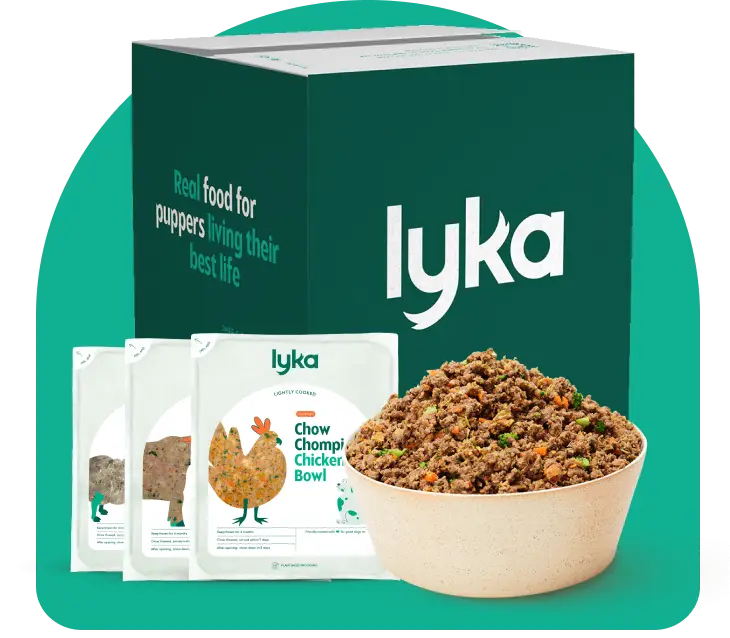What is your dog's microbiome, and how does their food affect it?

By Olivia Blazevic

At Lyka, we’re constantly staying up to date on the latest scientific research that may have an affect on your pupper’s health, and evidence around the gut microbiome is one area that’s evolving fast. You’ve probably heard of the microbiome because of its importance to our own health.
Well, it looks like the microbiome is important for our pups, too. There’s a lot of complex science that surrounds the microbiome, so we’ve made the info a little easier to digest!
What is the gut microbiome?
Basically, your dog’s gut microbiome refers to the trillions of microorganisms, like bacteria, and even viruses and fungi, that live in the gastrointestinal tract – as well as all of the neurotransmitters, hormones and vitamins that they produce. Once thought to be unwanted invaders that could cause harm, we now know that there are loads of beneficial bacteria that are key to your pup’s health. The good news is that the health of your dog’s microbiome can be affected by the quality and content of what they eat. Generally, the more diverse the microbiome, the better. This is where diet can help and play a huge role in the overall health of your pup.
Fact: It’s estimated that there are 10x more bacteria in the gut microbiome than there are cells in your pup’s whole body!
How can the gut microbiome affect your pup’s health?
The gut microbiome can have far reaching effects on the overall health of your pupper, not just on their digestion. The microbiome plays a role in immunity, metabolism and many other aspects of health too.
It helps to modulate the immune system
A microbiome with a healthy balance of beneficial bacteria can help to protect against invading pathogens
It acts on components in food to provide nutrients to your dog
What is dysbiosis?
It’s not just the number and diversity of microorganisms in the microbiome that’s important, but the balance that exists between them as well. In a healthy microbiome, all the microorganisms live in harmony. When this balance is disrupted, it results in dysbiosis, which can lead to health problems.
Common causes of dysbiosis include:
Antibiotics – they can cause dysbiosis because they don’t just target the ‘bad’ bacteria – they affect the ‘good’ bacteria that exist in the microbiome, too
Inflammation of the GI tract can also cause dysbiosis
Effects of dysbiosis include:
Gut hyperpermeability – this is where the gut lining doesn’t function properly, allowing food particles to leak into the bloodstream
Increased competition for nutrients including Vitamin B12
New studies are linking aggression and anxiety or phobia to certain dysbiotic microbiome patterns
How can your pup’s diet help?

What you feed your pupper can affect their microbiome – it comes down to the ingredients themselves and how the food is cooked or processed. Here are a few highlights:
Simple carbohydrates in the diet may lead to changes in the microbiome that could be associated with metabolic disease – complex non-digestible carbohydrate substrates on the other hand, may have a positive impact on gut microbiota composition and diversity
Foods like kibble, which are cooked under extremely high direct heat, undergo something called a Maillard reaction – this is a chemical reaction that gives browned foods their distinctive flavour, but which also reduces microbiome diversity in heat-processed foods
A high protein, low carbohydrate diet leads to higher levels of phylum Fusobacteria, a key bacterial species that’s present in faecal samples of healthy dogs
Tryptophan (found in chicken, eggs, turkey, lamb, beef) is metabolised by bacteria into indole, a chemical which has been shown to have an anti-inflammatory effect and may help strengthen the gut barrier – the first line of defence against harmful pathogens
Why is Lyka good for your dog’s microbiome?
There are plenty of reasons why Lyka recipes support your pup’s microbiome and help keep them healthy:
Lyka recipes are lightly cooked at low temperatures, avoiding the Maillard reaction and retaining the microbiome diversity
There are no simple carbohydrates
They contain ingredients such as chicken, eggs, turkey, lamb and beef that are naturally high in tryptophan
The high protein: low carbohydrate balance supports the health and diversity of the microbiome
Make your pup’s microbiome happy and order a Starter Box today!





